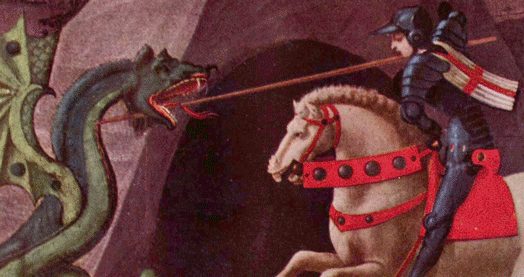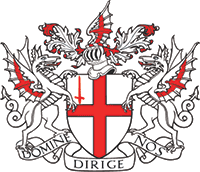
Saint George Slaying the Dragon as envisioned by Paolo Uccello
Dragons are an ancient and culturally ubiquitous symbol that finds its way into epic poetry, religion, and local legend the world over.
Today they live in our imaginations – on TV, in movies, and in modern fantasy fiction.
I’ve always had an affection for dragons – or more accurately – I should say that I am slightly obsessed with hunting them down and slaying them.
What is a Dragon? A Villain’s Symbolic Archetype
They kind of look like lizards, they have wings, and they breath fire – but the physical appearance of a dragon offers few clues into its psychological profile and role as a symbolic villain archetype.
- Dragons are Intellectual – Unlike most beasts and monsters, dragons are often depicted as cold and calculating killers. They do more than simply kill to survive like a lion would, they kill for wealth and political purposes (like securing more land and territory than they need.)
- Dragons are Aggressive – You can’t just leave one alone and hope to live in peace. Any village or kingdom looks ripe for plundering is sure to attract a dragon or two.
- Dragons Hoard Wealth – Dragons also symbolize a certain type of financial elite that plunders and hordes wealth. In describing the dragon’s reaction to the loss of a single cup, Tolkien wrote the anger could only be compared to “when rich folk that have more than they can enjoy lose something they have long had but never before used or wanted.” While the serfs starve, while they watch their farms burn, the dragon sits with treasure beyond imagination – counting its pennies with no concern for those who have died or will die in the process.
Power and Good Fortune
Of course, the symbolic associations attached to dragons greatly vary from culture to culture. In Korea, Japan, and China – dragons are often associated with the water and seen as potent forces of good luck and prosperity. The strength of the dragon and its magical essence are retained, but the view of an aggressive villain are not necessarily the same.
In China, the dragon was long associated with the emperor, but they have since backed off this relationship as it can have negative connotations to those nations in the west that still see dragons as the bad guy. This doesn’t stop the dragon from popping up as an image of national pride, the male archetype, and social power.
Dragons and Empire

“City of London Corporation” Coat of Arms
The city of London isn’t just a municipality, it is an independent incorporation – a one-mile by one-mile square in the financial heart of the city. It is the international banking capital of the globe, and rent seeking mentality of its elite is older than the country we call England today.
Chinese Astrology and the Wolf
In Chinese Astrology, the wolf is seen as a polar opposite to the dragon. Wolves and dogs represent loyalty, defensive protection, and cooperation. Dogs run in a pack and rarely turn on their masters when treated well.
Funny enough, I was born in the year of the dog (1982). When I was up for Confirmation in the Catholic Church, I picked Saint George as a patron saint (All good heroes should slay a dragon or two). Many of the video games I play involve slaying dragons and yes, I’ve even spent too many hours with pen and paper and 20 sided dice trying to kill off dragons that only exist in a dungeon master’s manual.
Why the dragon?
Honestly, they’re just that cool. Even if they’re usually evil. All the explanation, all the coincidence, it just helps make them seem even cooler.

Comments
3 Comments
RSS